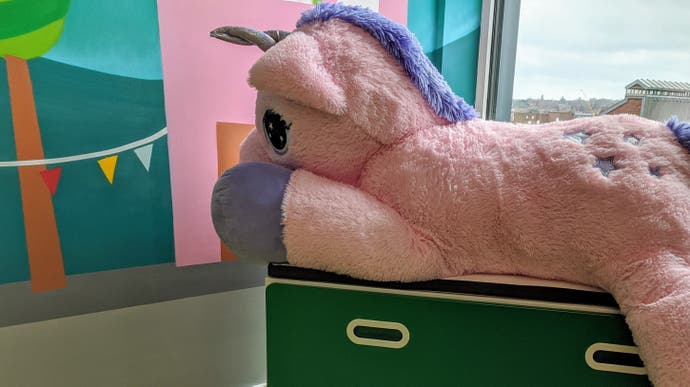The priceless work of Make-A-Wish, and the potential of games
"There's a moment in time here..."
"The one that's most fresh in my mind is George's wish."
I'm talking to Jason Suckley, CEO of the Make-A-Wish Foundation in the UK.
"I met George and his mum a couple of years ago, and he had, at the time, they knew he had a terminal condition, so they created what she called a 'bucket and spade list' because he was too young to have a bucket list. He couldn't speak at that time because he'd lost his power of speech but they were obviously very, very close. And one of the things on the list was to go tobogganing in Austria.
"We were able to say yes.
"Half-way down the mountain she asked him a question and he spoke to her for the first time in eighteen months."
She asked something like, "Are you having fun?" And he replied something like, "Yes I am." But the words don't really matter: he spoke.
"Um..." Suckley falters.
"I never should have chosen this wish.
"Then George passed away not long after that."
They show me a video of George's wish. They'd rather I don't share it here, because it would draw a lot of attention to it, but there are other videos you can watch it on the Make-A-Wish YouTube channel. I watch as George careers down a tobogganing run sandwiched between his mum's legs, and he is - they are - having a great time. His mum talks about hearing him speak and what it means to her, and what the experience meant to her and George, and it means the world.
As the video ends, there are sniffles around me. Suckley has been streaming. He turns to me, sees my eyes and says, "Don't take away sadness.
"As you can see, it's more about the power of the wish and the difference wishes make. That, inherently, is a sad story, but it is much more than that. The memories of those moments will last a lifetime, and they do last a lifetime, however long ago it was."
Then he smiles and says, "I'm going to get a cup of tea," and he does.
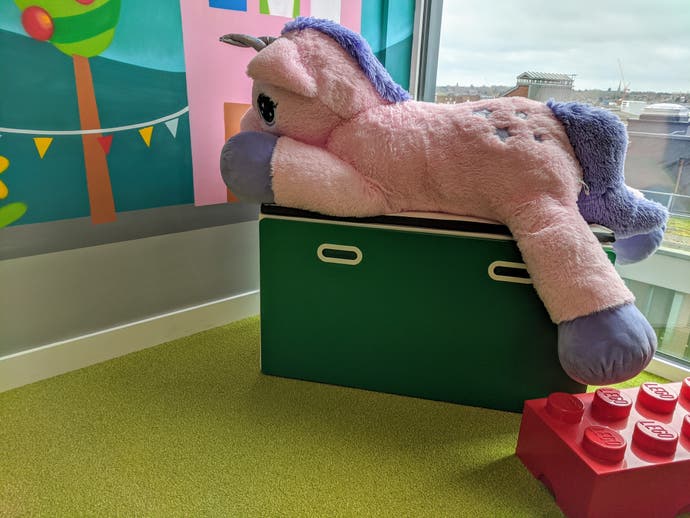
You might have heard of Make-A-Wish. Bethesda's Todd Howard has talked about how inviting Make-A-Wish children to the famous Elder Scrolls studio was "by far the greatest thing" it does, and John Cena, the superstar wrestler, regularly meets Make-A-Wish children. He's the record holder with 600 wishes granted, which is extraordinary, although he's far from the only celebrity involved. Bieber has 250.
Make-A-Wish is a charity which grants critically ill children their heart's desire, whatever that may be. Maybe they want to meet John Cena, maybe they want to visit Bethesda, maybe they want something else. Whatever it is, Make-A-Wish tries to fulfil that.
Make-A-Wish turns 40 this year in the US, which is where the Foundation began, but there are arms of the organisation all around the world, including the UK. Here it's nearly as old, having opened in 1986. Until fairly recently, it was hidden away in Camberley in the middle of a housing estate with paint peeling off the office walls, but now it's in the historic town of Reading, high up in the flashy Thames Tower, with great views, a playroom and a den, and even a star-shaped entrance. It's bright and cheery. Dozens of people work here.
In the room with me are a handful of people.
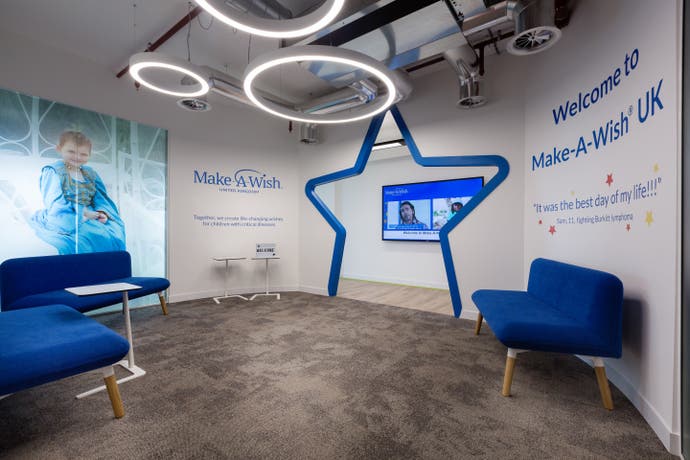
Nicola Briggs has been here the longest: 10 years in September. The seed was planted when a friend had a wish granted back in 1996, a holiday to Florida, to go to the theme parks and swim with dolphins. One day years later, while working at Mercedes Benz, the seed germinated. Briggs realised 'I could be doing something better with my time' and left. Today she manages the Wishgranting teams.
Next to her is Daniel O'Reilly, who used to drive past the Camberley Make-A-Wish office every day. He had a degree in graphics but wanted to do something caring, and would look up at the Make-A-Wish office and think, 'I want to work there.' He's a senior Wishgranter now.
Katrina Shaw is on the fundraising team. She worked in financial services until an old colleague pulled her over to the charity world, needing her help, and she never left. "I was exactly the same as everyone else," she says, "like, 'Oh that's nice.' Then I got here and was like, 'No, it's not nice, it's imperative for critically ill children to have the wishes we grant.'"
Then there's Rosie Parrish, the newest of the team, the press officer. The turning point for her was in a cinema, seeing an advert for a charity she'd done agency PR work for. "I was like, 'I'm a part of that.' That was my 'I want to work in a charity' moment,' she says.
Katy Meade has been here the next longest, around eight years. She's a career fundraiser - her family were charitable so she believes it was somewhat inevitable. She also knew someone who had a wish granted - a niece on her husband's side.
"Her wish was to go on a family holiday," Katy Meade says. "She's one of four children, they live in a small, remote part of Northern Ireland, and they'd been through a really difficult time when she was ill. Juggling four children: I don't know how their mum does it. When you've got one child who is constantly being rushed off to the nearest hospital, which is two hours away, it really just drove a massive wedge in the family.
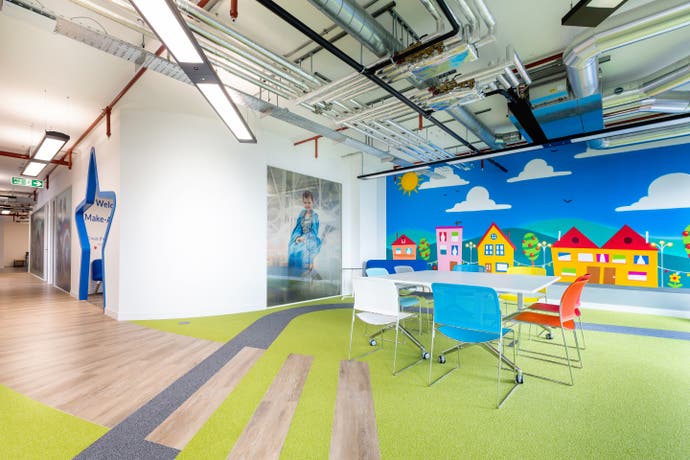
"Her wish was over ten years ago now but they still talk about it as bringing the family back together. I knew from them how powerful the work Make-A-Wish does was, and that was it, all these years later I've not left."
Then finally there's Jason Suckley, who's been here five years, and comes from a place I really didn't expect: BP, the gas and oil giant. He'd worked there for about 10 years when he had his epiphany. "I remember being in the global head office in St. James's Square," he says, "and there were people there, in my eyeline, hanging out of a tree - literally hanging out of a tree - saying, 'Get a life. Do something decent with your life.'" And he did.
To make a wish, a child has to be between three years old and 17, and be fighting a critical illness. Families cannot apply directly any more because demand got too high, so children have to be referred through a play specialist nurse or social worker instead. And if they've already had a wish granted by a similar organisation, such as Starlight Children's Foundation, Rays of Sunshine, or Dreams Come True, they won't be eligible.
If all is good, two local volunteers head out to "capture the child's one true wish", as Nicola Briggs puts it. Some things are off the table. Make-A-Wish UK can only offer travel around the UK and to Europe and Florida, for the theme parks. It couldn't send someone to Bethesda Game Studios in Maryland, then, but it could refer the child to Make-A-Wish US.
This works the other way around as well. There was a boy from the US, called Erik, who had a very unusual passion: vacuuming. He wanted more than anything to visit the Henry Hoover factory in the UK, so Make-A-Wish UK made his wish come true.
Then there's the Taiwanese girl and her noodles. "Just this week we had a wish from Make-A-Wish Taiwan for a young lady who has leukaemia and as a result, her appetite has been affected and her taste buds have been shot," says Briggs. "But she absolutely craves the taste of instant noodles.
"Her request is to receive instant noodles from all around the globe."
Why Britain? Because of our delicious Pot Noodle cuisine, of course. And Pot Noodle rose to the occasion. "They've rewritten their story, their timeline - about when new models were introduced and where - and right at the end, they put her photo in their story and it says, 'In 2020, the world's biggest noodle fan tried her first Pot Noodle.'"
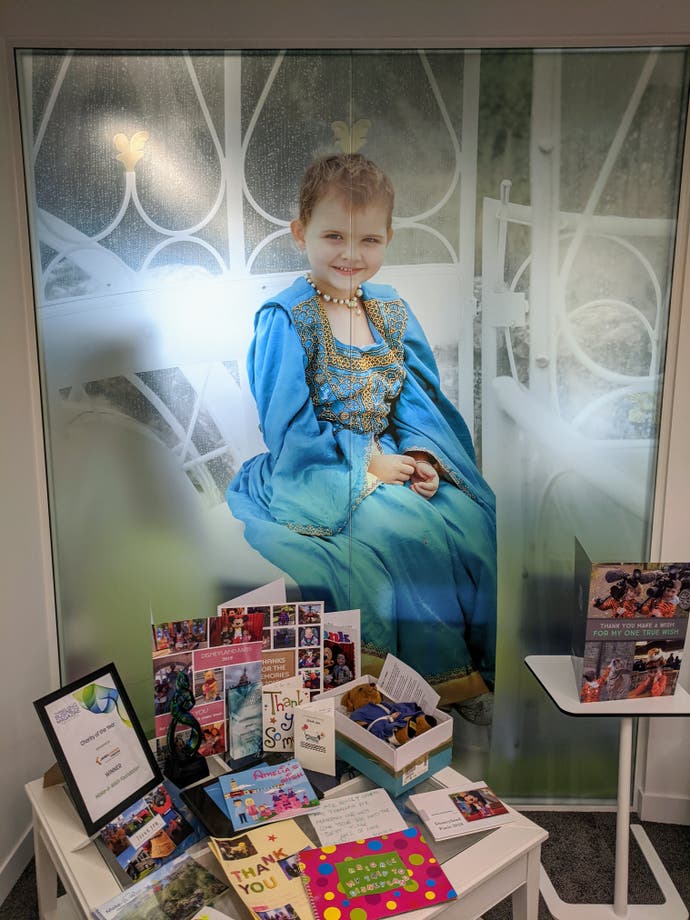
But these are relatively easy wishes to grant. It's much harder when a girl turns around to you and says she wants to be a ninja princess, and ride on a carriage drawn by unicorns to do battle in the grounds of a castle. A girl after my own heart I must say. Surprisingly though, Make-A-Wish UK made this happen. There's a huge picture of the girl all dressed up and sitting in a carriage, presumably pre-battle, on the wall of the room I'm sitting in, and similar pictures - of other kids on days out - can be seen on other office walls.
These wishes are about running with the unbound imagination of a child and saying yes to whatever they ask, and coming up with a creative way to fulfil it. "We never say no, really," says Briggs. "Even if someone wanted to go to the moon, we could potentially recreate the moon."
"Why do you want to go to the moon?" Make-A-Wish would ask. "Because I want to feel weightlessness," the child might answer. "Well, there are places where you can do that without going to the moon," Briggs carries on. "'I want to see what it looks like.' Well, maybe we can work with somebody who could recreate the surface of the moon for us.
"There are other ways of delivering a child's wish, not just the obvious."
Take, for instance, a wish Daniel O'Reilly is tackling. There's a little boy who wants to be the Blue Power Ranger and fight baddies, and then, and this flourish warms my heart, he wants to go to Chinatown for noodles. How does O'Reilly go about realising this?
"I reached out to a Power Ranger cosplayer and asked if he'd make a cosplay suit for this kid," O'Reilly says, "which he is at cost price, and he put an ask out on his Facebook to see if there are any Power Rangers in the UK that do it professionally, because when I was Googling I couldn't find anyone. And we've been reached by a group of professional cosplay Power Rangers that will grant him his wish."
Now O'Reilly has gloves coming from somewhere else, morph suits to buy for the baddies, a laser tag venue to book in London, which Make-A-Wish uses quite a lot apparently, and a noodle house to find. On top of that he's got accomodation to book for the family and travel to sort. "It's piecing things together like a jigsaw," he says. And jigsaws take time.
"Gaming represents the biggest single new fundraising opportunity we've got."
Other wishes aren't so complicated. A trip to Disneyland Paris has been done many times before, and there's a trusted supplier in place and it's just a question of dates. Or if it's a wish for something the child wants to possess, like a gaming PC, a great choice incidentally, it's as simple as ordering it.
Every wish follows the same pattern, the same process. There's the initial call with the family, after the volunteer visit, to begin designing the wish in more detail. It's a chance to manage expectations and get everyone on the same page.
Then, it's into research and design, and when that's all collected, it's back to the family to propose the wish to them. Some things may not work for them. Perhaps the noodle house in Chinatown isn't right for some reason, so a bit more research and design may need to be done. But once all is agreed upon, you can book, and then it's everyone's favourite invoices and payments part.
At six weeks to go, bookings are finalised and Make-A-Wish checks in with the family about the current health of the child, and gets any updated medical certificates which may be required.
At two weeks to go, a Wish Pack is sent out which contains a full itinerary and booking confirmations, and a few useful gifts from Make-A-Wish. They are a baseball cap, a badge and a drawstring bag, and they're given in the hope they'll be seen wherever the kid is going and encourage a bit of extra help.
The only thing left after that is to go on the wish and have a great time.
"The average journey from qualification out the other end, to their wish being granted, is twelve months," says Briggs.
How many wishes do you think Make-A-Wish UK grants each year?
Nope.
It's 1200-1300. It's incredible.
The world of gaming is the next big challenge for Make-A-Wish UK because there's so much more it could be doing. There have been gaming wishes granted before. RuneScape maker Jagex used to be a really popular destination but not so much any more, and there have been trips to Yooka-Laylee studio Playtonic, Forza Horizon studio Playground Games, and Sea of Thieves studio Rare, which is where I really want to go.
A few influencers have been helping raise awareness for Make-A-Wish too, like DanTDM, but it's all just the tip of what Make-A-Wish hopes will be an iceberg.
There's been a shift, you see. The old kind of celebrities - pop stars and actors and TV personalities - aren't as popular with kids any more. "Every week there's another name on the list and we're all like, 'Who?' We have to go away and Google it," says Briggs. "Now, the majority of our wishes, from a celebrity point of view, are the influencers."
Cue GameStars, a brand new campaign aimed at influencers, or streamers, which lets you fundraise while you stream. Just set up a fundraising page and use provided overlays, and you're set. Influencer Syndicate helped Make-A-Wish launch GameStars a few weeks ago.
Anyone can be a GameStar, and to incentivise people, Make-A-Wish is giving away the X-Men arcade cabinet I complimented when I came into the room. Raise over £1000 and you'll be in the running for it.
When I ask how GameStars is doing, though, I'm only told there has been "interest" around it, which sounds like it's off to a slow start. But when you think of what could be achieved when influencers and streamers with huge followings throw their weight behind it, you begin to see the potential. It's why Jason Suckley says, "Gaming represents the biggest single new fundraising opportunity we've got."
Make-A-Wish needs it. The demand for wishes keeps rising and funding struggles to keep pace. More urgently, there's coronavirus to contend with.
When I visited Make-A-Wish on 10th March, the UK was still largely open. Wish children were still, according to Suckley, going to Disneyland Paris. That is no longer the case, and who knows how many other wishes won't come true now as a result of the pandemic.
When I visited, the London Marathon was still going ahead, and Make-A-Wish had £650,000 in fundraising wrapped up in it. What happens to that money now? Make-A-Wish relies on outdoor events and activities for fundraising and they have all been either postponed or cancelled.
In a statement sent to me 20th March, Make-A-Wish said it was facing losing up to 20 percent of its income as a result of cancelled events. As a result, "We have had to make the difficult decision, for the first time in our 34-year history, to turn children away. We simply cannot continue to meet demand."
Gaming could be a lifeline.
It's not just about money. It's about establishing a new network to call on to make wishes come true. It's a two-way street. Think about the Power Ranger wish, and how Daniel O'Reilly made inroads with the cosplay community: those ties are established now. Should another child want something similar, Make-A-Wish is much better placed to realise it.
Imagine if influencers, who were helping fundraise for Make-A-Wish, were also working with Make-A-Wish to meet members of their own communities. The connections are all already there, there's a beautiful synergy, and it could be the same for game developers and their audience too.
"We already saw gaming as a big opportunity for the organisation," says Jason Suckley. "Big time it is now, even over the course of the next two or three months. There's a moment in time here where there's an opportunity for the gaming community to work with us to step up."
There's something else gaming offers which is very important too. I'll let Katy Meade's favourite wish paint the picture. "When I first started, we'd just granted a wish for a guy who was fifteen or sixteen," she says, "and his wish was he wanted to drive a car. I really vividly remember it because it really brought it home that he was about to turn 17, and all his mates were going to be learning how to drive, and he knew that he was not going to reach that milestone because of his condition. It was just something that was so normal people would take it for granted."
So Make-A-Wish went to Mercedes and the people there gave him a car and let him drive it round and round their track. "For his mum to see that..." Meade adds. "She was really emotional watching it. It really brought home what some families are going through."
Gaming, like that wish and many others, helps children feel normal again. It allows children an escape from an illness dominating their day to day lives. It gives them something else to talk to their friends about, and a place to be where they are no different to them. "You get to be a person," says Katrina Shaw, "you get to be not just a sick kid."
It's priceless. Priceless like the look on a mother's face seeing her son drive a car. Priceless like the ninja princess, the Power Ranger, the Henry Hoover factory visit and Pot Noodle fame. Priceless like George. Priceless like every reconnected family and every moment that will last a lifetime. "We want to grant the wish of every child who turns to us," Jason Suckley tells me. Maybe we can help that come true.
